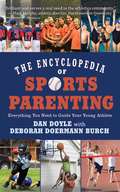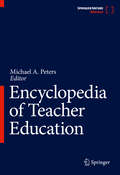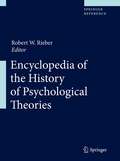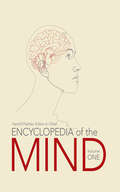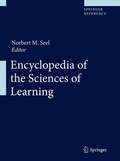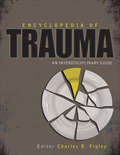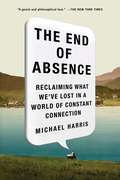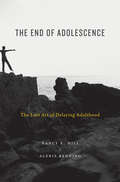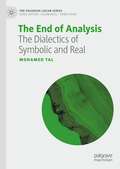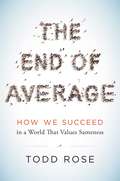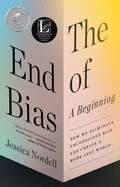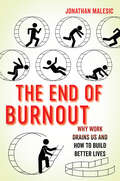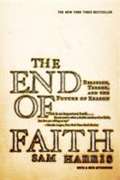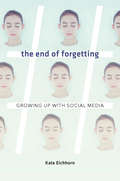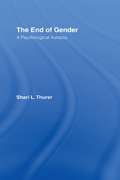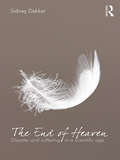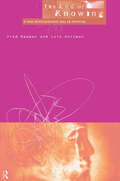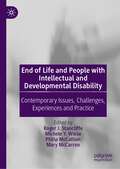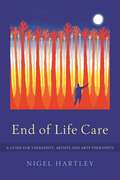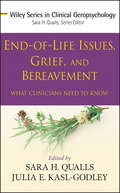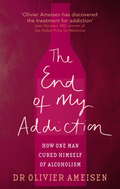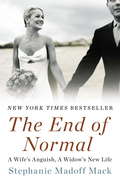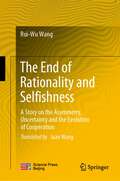- Table View
- List View
The Encyclopedia of Sports Parenting: Everything You Need to Guide Your Young Athlete
by Dan Doyle Deborah Doermann BurchFor more than a decade, former basketball coach Dan Doyle has been traveling the country, speaking to student-athletes and their parents about their involvement in and dedication to every sport imaginable. As founder and executive director of the Institute of International Sport at the University of Rhode Island, Doyle has attended his fair share of sporting events and has heard countless stories about confrontations taking place on and off the court between coaches, players, parents, and even fans.As the years passed, Doyle gathered everything he'd learned and heard and joined forces with Deborah Doermann Burch, a former schoolteacher and parenting expert, to write The Encyclopedia of Sports Parenting. Together, they surveyed more than 500 successful sports figures to gain additional insight into what parents can do to guide their children through the competitive, sometimes disheartening--though oftentimes rewarding--world of sports.In this book, parents will learn how to express themselves in various challenging situations, including learning that their children have been cut from teams; have become victims of team violence, hazing, or bullying; or are not receiving adequate and assumedly deserved playing time.
Encyclopedia of Teacher Education
by Michael A. PetersThis encyclopaedia is a dynamic and living reference that student teachers, teacher educators, researchers and professionals in the field of education with an accent on all aspects of teacher education, including: teaching practice; initial teacher education; teacher induction; teacher development; professional learning; teacher education policies; quality assurance; professional knowledge, standards and organisations; teacher ethics; and research on teacher education, among other issues. The Encyclopedia is an authoritative work by a collective of leading world scholars representing different cultures and traditions, the global policy convergence and counter-practices relating to the teacher education profession. The accent will be equally on teaching practice and practitioner knowledge, skills and understanding as well as current research, models and approaches to teacher education.
Encyclopedia of the History of Psychological Theories
by Robert W. RieberThis work will survey the entire range of thinking in psychology, from ancient times to the present, encompassing philosophies and theories of mind that pre-date our modern conception of psychology as a science, and extending to the current findings of neuroscience. It will set the theories into their historical context and cross-reference key influences, such as Darwin's on Freud. Fifteen hundred entries will comprise key figures, theoretical concepts, false theories, historical events, and seminal writings. International in scope, this project will involve history of psychology experts from around the world and the coverage of topics will be set in global context. The aim will be to provide a reference work of more depth than discussions that are currently available in textbooks, with the ability to connect to a multitude of relevant topics. This work will provide a picture of psychology as it has emerged into the present time and position it among other related fields such as anthropology, sociology, philosophy, and medicine.
Encyclopedia of the Mind
by Harold PashlerIt's hard to conceive of a topic of more broad and personal interest than the study of the mind. In addition to its traditional investigation by the disciplines of psychology, psychiatry, and neuroscience, the mind has also been a focus of study in the fields of philosophy, economics, anthropology, linguistics, computer science, molecular biology, education, and literature. In all these approaches, there is an almost universal fascination with how the mind works and how it affects our lives and our behavior. Studies of the mind and brain have crossed many exciting thresholds in recent years, and the study of mind now represents a thoroughly cross-disciplinary effort. Researchers from a wide range of disciplines seek answers to such questions as: What is mind? How does it operate? What is consciousness?This encyclopedia brings together scholars from the entire range of mind-related academic disciplines from across the arts and humanities, social sciences, life sciences, and computer science and engineering to explore the multidimensional nature of the human mind.
Encyclopedia of the Sciences of Learning
by Norbert M. SeelOver the past century, educational psychologists and researchers have posited many theories to explain how individuals learn, i.e. how they acquire, organize and deploy knowledge and skills. The 20th century can be considered the century of psychology on learning and related fields of interest (such as motivation, cognition, metacognition etc.) and it is fascinating to see the various mainstreams of learning, remembered and forgotten over the 20th century and note that basic assumptions of early theories survived several paradigm shifts of psychology and epistemology. Beyond folk psychology and its naïve theories of learning, psychological learning theories can be grouped into some basic categories, such as behaviorist learning theories, connectionist learning theories, cognitive learning theories, constructivist learning theories, and social learning theories. Learning theories are not limited to psychology and related fields of interest but rather we can find the topic of learning in various disciplines, such as philosophy and epistemology, education, information science, biology, and - as a result of the emergence of computer technologies - especially also in the field of computer sciences and artificial intelligence. As a consequence, machine learning struck a chord in the 1980s and became an important field of the learning sciences in general. As the learning sciences became more specialized and complex, the various fields of interest were widely spread and separated from each other; as a consequence, even presently, there is no comprehensive overview of the sciences of learning or the central theoretical concepts and vocabulary on which researchers rely. The Encyclopedia of the Sciences of Learning provides an up-to-date, broad and authoritative coverage of the specific terms mostly used in the sciences of learning and its related fields, including relevant areas of instruction, pedagogy, cognitive sciences, and especially machine learning and knowledge engineering. This modern compendium will be an indispensable source of information for scientists, educators, engineers, and technical staff active in all fields of learning. More specifically, the Encyclopedia provides fast access to the most relevant theoretical terms provides up-to-date, broad and authoritative coverage of the most important theories within the various fields of the learning sciences and adjacent sciences and communication technologies; supplies clear and precise explanations of the theoretical terms, cross-references to related entries and up-to-date references to important research and publications. The Encyclopedia also contains biographical entries of individuals who have substantially contributed to the sciences of learning; the entries are written by a distinguished panel of researchers in the various fields of the learning sciences.
Encyclopedia of Trauma: An Interdisciplinary Guide
by Dr Charles R. FigleyTrauma is defined as a sudden, potentially deadly experience, often leaving lasting, troubling memories. Traumatology (the study of trauma, its effects, and methods to modify effects) is exploding in terms of published works and expanding in terms of scope. Originally a narrow specialty within emergency medicine, the field now extends to trauma psychology, military psychiatry and behavioral health, post-traumatic stress and stress disorders, trauma social work, disaster mental health, and, most recently, the subfield of history and trauma, with sociohistorical examination of long-term effects and meanings of major traumas experienced by whole communities and nations, both natural (Pompeii, Hurricane Katrina) and man-made (the Holocaust, 9/11). One reason for this expansion involves important scientific breakthroughs in detecting the neurobiology of trauma that is connecting biology with human behavior, which in turn, is applicable to all fields involving human thought and response, including but not limited to psychiatry, medicine and the health sciences, the social and behavioral sciences, the humanities, and law. Researchers within these fields and more can contribute to a universal understanding of immediate and long-term consequences–both good and bad–of trauma, both for individuals and for broader communities and institutions. Trauma encyclopedias published to date all center around psychological trauma and its emotional effects on the individual as a disabling or mental disorder requiring mental health services. This element is vital and has benefited from scientific and professional breakthroughs in theory, research, and applications. Our encyclopedia certainly will cover this central element, but our expanded conceptualization will include the other disciplines and will move beyond the individual.
The End of Absence
by Michael HarrisSoon enough, nobody will remember life before the Internet. What does this unavoidable fact mean? Those of us who have lived both with and without the crowded connectivity of online life have a rare opportunity. We can still recognize the difference between Before and After. We catch ourselves idly reaching for our phones at the bus stop. Or we notice how, midconversation, a fumbling friend dives into the perfect recall of Google. In this eloquent and thought-provoking book, Michael Harris argues that amid all the changes we're experiencing, the most interesting is the end of absence-the loss of lack. The daydreaming silences in our lives are filled; the burning solitudes are extinguished. There's no true "free time" when you carry a smartphone. Today's rarest commodity is the chance to be alone with your thoughts. Michael Harris is an award-winning journalist and a contributing editor at Western Living and Vancouvermagazines. He lives in Toronto, Canada.ct recall of Google. In this eloquent and thought-provoking book, Michael Harris argues that amid all the changes we're experiencing, the most interesting is the one that future generations will find hardest to grasp. That is the end of absence--the loss of lack. The daydreaming silences in our lives are filled; the burning solitudes are extinguished. There's no true "free time" when you carry a smartphone. Today's rarest commodity is the chance to be alone with your own thoughts. To understand our predicament, and what we should do about it, Harris explores this "loss of lack" in chapters devoted to every corner of our lives, from sex and commerce to memory and attention span. His book is a kind of witness for the "straddle generation"--a burst of empathy for those of us who suspect that our technologies use us as much as we use them. By placing our situation in a rich historical context, Harris helps us remember which parts of that earlier world we don't want to lose forever. He urges us to look up--even briefly--from our screens. To remain awake to what came before. To again take pleasure in absence.
The End of Absence
by Michael Harris"Every revolution in communication technology--from papyrus to the printing press to Twitter--is as much an opportunity to be drawn away from something as it is to be drawn toward something. And yet, as we embrace a techonology's gifts, we usually fail to consider what we're giving up in the process. Why would we bother to register the end of solitude, of ignorance, of lack? Why would we care that an absence had disappeared?" Soon enough, nobody will remember life before the Internet. What does this unavoidable fact mean? For future generations, it won't mean anything very obvious. They will be so immersed in online life that questions about the Internet's basic purpose or meaning will vanish. But those of us who have lived both with and without the crowded connectivity of online life have a rare opportunity. We can still recognize the difference between Before and After. We catch ourselves idly reaching for our phones at the bus stop. Or we notice how, mid-conversation, a fumbling friend dives into the perfect recall of Google. In this eloquent and thought-provoking book, Michael Harris argues that amid all the changes we're experiencing, the most interesting is the one that future generations will find hardest to grasp. That is the end of absence--the loss of lack. The daydreaming silences in our lives are filled; the burning solitudes are extinguished. There's no true "free time" when you carry a smartphone. Today's rarest commodity is the chance to be alone with your own thoughts. To understand our predicament, and what we should do about it, Harris explores this "loss of lack" in chapters devoted to every corner of our lives, from sex and commerce to memory and attention span. His book is a kind of witness for the "straddle generation"--a burst of empathy for those of us who suspect that our technologies use us as much as we use them. By placing our situation in a rich historical context, Harris helps us remember which parts of that earlier world we don't want to lose forever. He urges us to look up--even briefly--from our screens. To remain awake to what came before. To again take pleasure in absence.
The End of Adolescence: The Lost Art of Delaying Adulthood
by Nancy E. Hill Alexis ReddingIs Gen Z resistant to growing up? A leading developmental psychologist and an expert in the college student experience debunk this stereotype and explain how we can better support young adults as they make the transition from adolescence to the rest of their lives. Experts and the general public are convinced that young people today are trapped in an extended adolescence—coddled, unaccountable, and more reluctant to take on adult responsibilities than previous generations. Nancy Hill and Alexis Redding argue that what is perceived as stalled development is in fact typical. Those reprimanding today’s youth have forgotten that they once balked at the transition to adulthood themselves. From an abandoned archive of recordings of college students from half a century ago, Hill and Redding discovered that there is nothing new about feeling insecure, questioning identities, and struggling to find purpose. Like many of today’s young adults, those of two generations ago also felt isolated and anxious that the path to success felt fearfully narrow. This earlier cohort, too, worried about whether they could make it on their own. Yet, among today’s young adults, these developmentally appropriate struggles are seen as evidence of immaturity. If society adopts this jaundiced perspective, it will fail in its mission to prepare young adults for citizenship, family life, and work. Instead, Hill and Redding offer an alternative view of delaying adulthood and identify the benefits of taking additional time to construct a meaningful future. When adults set aside judgment, there is a lot they can do to ensure that young adults get the same developmental chances they had.
The End of Analysis: The Dialectics of Symbolic and Real (The Palgrave Lacan Series)
by Mohamed TalThis book interrogates the “end of analysis” in psychoanalytic thought from Freud to Lacan. It demonstrates that the notions of mourning, renunciation, liquidation of transference, and traversal of fantasy cannot serve as a settlement for the castration complex (i.e., central to neurosis) but are rather prey to the castration complex itself. It shows how psychoanalysis remains incomplete as long as it has not surpassed them as fantasies sustained by psychoanalytic ideology. In other words, it argues that the analytic procedure must pull psychoanalysis out of this therapeutic tradition for it to be complete and to instigate an attempt of its renewal.The book equally revisits Freud’s and Lacan’s underpinnings in the Enlightenment project, in order to formulate the problem of transference on proper dialectical foundations—that is, the mechanism of alienation from Descartes to Hegel, Kierkegaard’s concept of anxiety, as well as the concepts of authority and value in Durkheim, Mauss, and Marx. In doing so, it provides fresh insights that will appeal to practitioners, as well as to scholars of psychoanalysis and philosophy.
The End of Average: How We Succeed in a World That Values Sameness
by Todd RoseAre you above average? Is your child an A (or a C) student? Is your employee an introvert or an extrovert? Every day we are measured against the yardstick of averages, judged according to how closely we resemble it or how far we deviate from it. The assumption that metrics comparing us to an average--like development milestones, GPAs, personality assessments, standardized test results, and performance review ratings--reveal something meaningful about our potential is so ingrained in our consciousness that we rarely question it. That assumption, says Harvard's Todd Rose, is spectacularly--and scientifically--wrong.In The End of Average, Rose shows that no one is average. Not you. Not your kids. Not your employees or students. This isn't hollow slogan-eering--it's a mathematical fact with enormous practical consequences. But while we know people learn and develop in distinctive ways, these unique patterns of behaviors are lost in our schools and businesses which have been designed around the mythical "average person." For more than a century, this average-size-fits-all model has ignored our individuality and failed at recognizing talent. It's time to change that.Weaving science, history, and his experiences as a high school dropout, Rose brings to life the untold story of how we came to embrace the scientifically flawed idea that averages can be used to understand individuals and offers a powerful alternative: the three principles of individuality. The jaggedness principle (talent is never one- dimensional), the context principle (traits are a myth), and the pathways principle (we all walk the road less traveled) help us understand our true uniqueness--and that of others--and how to take full advantage of individuality to gain an edge in life.This powerful book will forever change how you see averages and talent.Praise for The End of Average " Todd Rose shows that everything we think we know about 'average' performance is wrong. In fact, our one-dimensional understanding of achievement--our search for the average score, average grade, average talent--has seriously underestimated human potential. This book is readable, enlightening, and way above average."--DANIEL H. PINK, author of To Sell Is Human and Drive " Fascinating, engaging, and practical. Todd Rose dispels the myth that our success can be divined by a simple number or average, whether a grade, a score in a standardized test, or a ranking at work. The End of Average will help everyone--and I mean everyone--live up to their potential."--AMY CUDDY, professor at Harvard Business School and author of Presence" Todd Rose has achieved a rare feat: he is both provocative and right. He overturns our fundamental assumptions about talent, and offers an empowering way to re-think the world. With exciting stories, fresh data, and bold ideas, this book is far better than average."--ADAM GRANT, Wharton professor and New York Times bestselling author of Give and Take and Originals " Consistently mind-blowing!"--Dan Heath, coauthor of the New York Times bestsellers Made to Stick, Switch, Decisive" Todd Rose's thought-provoking book challenges the explanatory power of the everyday term 'average,' opening our minds to new ways of conceptualizing human variation and human potentials."--HOWARD GARDNER, author of Truth, Beauty, and Goodness Reframed " In the midst of a war for talent, we miss huge opportunities to find it. This stunning book shows how almost all the measures we use reduce complicated individuals to one-dimensional beings. As a result, we overlook how talent, context, and disposition fold together to create individual uniqueness. I couldn't put this book down."--JOHN SEELY BROWN, independent cochair of Deloitte's Center for the Edge and coauthor of The Social Life of Information, The Power of Pull, and The New Culture of Learning
The End of Bias: The Science and Practice of Overcoming Unconscious Bias
by Jessica NordellThe End of Bias is a transformative, groundbreaking exploration into how we can eradicate unintentional bias and discrimination, the great challenge of our age.Unconscious bias: persistent, unintentional prejudiced behavior that clashes with our consciously held beliefs. We know that it exists, to corrosive and even lethal effect. We see it in medicine, the workplace, education, policing, and beyond. But when it comes to uprooting our prejudices, we still have far to go.With nuance, compassion, and ten years' immersion in the topic, Jessica Nordell weaves gripping stories with scientific research to reveal how minds, hearts, and behaviors change. She scrutinizes diversity training, deployed across the land as a corrective but with inconsistent results. She explores what works and why: the diagnostic checklist used by doctors at Johns Hopkins Hospital that eliminated disparate treatment of men and women; the preschool in Sweden where teachers found ingenious ways to uproot gender stereotyping; the police unit in Oregon where the practice of mindfulness and specialized training has coincided with a startling drop in the use of force.Captivating, direct, and transformative, The End of Bias: A Beginning brings good news. Biased behavior can change; the approaches outlined here show how we can begin to remake ourselves and our world. Includes illustrated charts
The End of Burnout: Why Work Drains Us and How to Build Better Lives
by Jonathan MalesicGoing beyond the how and why of burnout, a former tenured professor combines academic methods and first-person experience to propose new ways for resisting our cultural obsession with work and transforming our vision of human flourishing. Burnout has become our go-to term for talking about the pressure and dissatisfaction we experience at work. But because we don’t really understand what burnout means, the discourse does little to help workers who are suffering from exhaustion and despair. Jonathan Malesic was one of those workers, and to escape he quit his job as a tenured professor. In The End of Burnout, he dives into the history and psychology of burnout, traces the origin of the high ideals we bring to our dismal jobs, and profiles the individuals and communities who are already resisting our cultural commitment to constant work. In The End of Burnout, Malesic traces his own history as someone who burned out of a tenured job to frame this rigorous investigation of how and why so many of us feel worn out, alienated, and useless in our work. Through research on the science, culture, and philosophy of burnout, Malesic explores the gap between our vocation and our jobs, and between the ideals we have for work and the reality of what we have to do. He eschews the usual prevailing wisdom in confronting burnout ("Learn to say no!" "Practice mindfulness!") to examine how our jobs have been constructed as a symbol of our value and our total identity. Beyond looking at what drives burnout—unfairness, a lack of autonomy, a breakdown of community, mismatches of values—this book spotlights groups that are addressing these failures of ethics. We can look to communities of monks, employees of a Dallas nonprofit, intense hobbyists, and artists with disabilities to see the possibilities for resisting a "total work" environment and the paths to recognizing the dignity of workers and nonworkers alike. In this critical yet deeply humane book, Malesic offers the vocabulary we need to recognize burnout, overcome burnout culture, and find moral significance in our lives beyond work.
The End of Faith: Religion, Terror and the Future of Reason
by Sam HarrisAn analysis of the clash between reason and religion in the modern world, calling for a foundation for ethics and spirituality that is secular and humanistic.
The End of Forgetting: Growing Up with Social Media
by Kate EichhornThanks to Facebook and Instagram, our younger selves have been captured and preserved online. But what happens, Kate Eichhorn asks, when we can’t leave our most embarrassing moments behind? Rather than a childhood cut short by a loss of innocence, the real crisis of the digital age may be the specter of a childhood that can never be forgotten.
The End of Gender: A Psychological Autopsy
by Shari L. ThurerGender isn't what it used to be. Categories are collapsing. What was deviant for baby boomers has become mainstream for their offspring: like the coed who realizes she's bisexual but, after a period of adjustment, shrugs her shoulders and gets on with her otherwise mundane life. Gender as we once understood it is over, and gender-bending is the new beat. Men sport ponytails and earrings and teach nursery school; women flaunt tatoos and biceps and smoke cigars.In The End of Gender, Shari L. Thurer argues that we are in the midst of a new sexual revolution. It is one where gender categories are blurring not just at the "fringes" of society, but in mainstream lifestyle, media, fashion, and art. So, why is this cultural phenomenon happening now? And what does it mean? In lively, non-technical language, and with sometimes surprising case studies from her 25 years as a psychologist, Thurer answers these questions, bridging complex postmodern theory with cutting edge psychoanalysis.
The End of Heaven: Disaster and Suffering in a Scientific Age
by Sidney DekkerIn this unique book, Sidney Dekker tackles a largely unexplored dilemma. Our scientific age has equipped us ever better to explain why things go wrong. But this increasing sophistication actually makes it harder to explain why we suffer. Accidents and disasters have become technical problems without inherent purpose. When told of a disaster, we easily feel lost in the steely emptiness of technical languages of engineering or medicine. Or, in our drive to pinpoint the source of suffering, we succumb to the hunt for a scapegoat, possibly inflicting even greater suffering on others around us. How can we satisfactorily deal with suffering when the disaster that caused it is no more than the dispassionate sum of utterly mundane, imperfect human decisions and technical failures? Broad in its historical sweep and ambition, The End of Heaven is also Dekker's most personal book to date.
End Of Knowing: New Developmental Way Of Learning
by Fred Newman Lois HolzmanFirst published in 1997. Routledge is an imprint of Taylor & Francis, an informa company.
End of Life and People with Intellectual and Developmental Disability: Contemporary Issues, Challenges, Experiences and Practice
by Roger J. Stancliffe Michele Y. Wiese Philip McCallion Mary McCarronThis book on end of life examines how to include people with intellectual and developmental disability in the inevitability of dying and death. Comprising 17 chapters, it addresses challenging and under-researched topics including suicide, do-not-resuscitate, advance care planning, death doulas and accessible funerals. Topics reflect everyday community, palliative care, hospice and disability services.The book proposes that the rights of people with disabilities should be supported up to and after their death. Going beyond problem identification, the chapters offer positive, evidence-supported responses that translate research to practice, together with practice examples and resources grounded in lived experience. The book is applicable to readers from the disability field, and mainstream health professionals who assist people with disability in emergency care, palliative care or end-of-life planning
End of Life Care: A Guide for Therapists, Artists and Arts Therapists
by Nigel HartleyThe many unfounded myths and fears that surround working with people at the end of their lives are dispelled in this thoughtful book, and the authors provide both practical and emotional support for those involved in caring for dying patients. The book covers everything from the philosophy behind the practice to the diverse roles in the multi-disciplinary team, as well as current challenges and opportunities facing end of life care, with an emphasis on how therapy and arts therapies can be integrated effectively. It also looks at palliative care models that address all aspects of a patient's wellbeing and conveys the latest research and challenges in the field, bridging the gap between theory and the realities of working with patients on a daily basis. Using material from artists and therapists working in the field, the varying demands of inpatient, outpatient and home care are described, as well as the processes of bereavement, how to handle the practicalities of loss and the help that therapists can give at this stage. How artists and therapists with experience of working at the end of life can be involved in other areas of care such as supporting older people in care homes and those living with dementia is also discussed. The book also introduces the important area of health promotion, and how there is a growing responsibility to change people's attitudes towards death, dying and bereavement. Clear, practical examples are given as to how this might be achieved. Full of professional advice and career guidance, this book will be an invaluable tool for those working with patients nearing the end of life and those considering working in this area, as well as students in training.
End-of-Life Issues, Grief, and Bereavement
by Sara Honn Qualls Julia E. Kasl-GodleyA practical overview of clinical issues related to end-of-life care, including grief and bereavement The needs of individuals with life-limiting or terminal illness and those caring for them are well documented. However, meeting these needs can be challenging, particularly in the absence of a well-established evidence base about how best to help. In this informative guide, editors Sara Qualls and Julia Kasl-Godley have brought together a notable team of international contributors to produce a clear structure offering mental health professionals a framework for developing the competencies needed to work with end-of-life care issues, challenges, concerns, and opportunities. Part of the Wiley Series in Clinical Geropsychology, this thorough and up-to-date guide answers complex questions often asked by patients, their families and caregivers, and helping professionals as well, including: How does dying occur, and how does it vary across illnesses? What are the spiritual issues that are visible in end-of-life care? How are families engaged in end-of-life care, and what services and support can mental health clinicians provide them? How should providers address mental disorders that appear at the end of life? What are the tools and strategies involved in advanced care planning, and how do they play out during end-of-life care? Sensitively addressing the issues that arise in the clinical care of the actively dying, this timely book is filled with clinical illustrations, guidance, tips for practice, and encouragement. Written to equip mental health professionals with the information they need to guide families and others caring for the needs of individuals with life-threatening and terminal illnesses, End-of-Life Issues, Grief, and Bereavement presents a rich resource for caregivers for the psychological, sociocultural, interpersonal, and spiritual aspects of care at the end of life. Also in the Wiley Series in Clinical Geropsychology Psychotherapy for Depression in Older Adults Changes in Decision-Making Capacity in Older Adults: Assessment and Intervention Aging Families and Caregiving
The End Of My Addiction: How one man cured himself of alcoholism
by Olivier AmeisenDr Olivier Ameisen was a brilliant cardiologist and running his own successful practice when he developed a profound addiction to alcohol. Fearing for his life, he immersed himself in AA, rehab and therapy. Nothing worked. So he did the only thing he could; he took his treatment into his own hands. Searching for a cure for his deadly disease, he happened upon baclofen, a muscle relaxant that had been used safely for years as a treatment for various types of muscle spasticity, but had more recently shown promising results in studies with laboratory animals addicted to a wide variety of substances. Dr Ameisen prescribed himself the drug and experimented with increasingly higher doses until he finally reached a level high enough to leave him free of any craving for alcohol. That was more than six years ago. Baclofen, as prescribed under a doctor's care, could possibly help many addicts. But as long as the medical and research establishments ignore a cure for one of the most deadly diseases in the world, we won't be able to understand baclofen's full potential. This book is a plea for research that can rescue millions from the scourge of addiction.
The End of Normal
by Stephanie Madoff MackA New York Times bestseller, the explosive and heartbreaking memoir from the widow of Mark Madoff and the daughter-in-law of Bernard Madoff When the news of Bernard Madoff’s Ponzi scheme broke, no one was more shocked than the members of his own family. Before then, Madoff’s son, Mark, and daughter- in-law, Stephanie, had built an idyllic life. Yet, while Mark’s thriving business was entirely separate from his father’s now notorious fund, he and Stephanie found themselves in the eye of the storm—and grappling with their own sense of betrayal. Mark refused to see or speak to his parents, and on the second anniversary of his father’s arrest, he hanged himself. Left to raise her children as a single mother, Stephanie tells the real story of her marriage to Mark, of being a part of the Madoff family, and of life for two years following her father-in-law’s arrest and incarceration. The End of Normal is a searing inside look at one of the most controversial stories of our time, and an extraordinary memoir of surviving personal tragedy amid public scandal. .
The End of Normal: A Wife's Anguish, A Widow's New Life
by Stephanie Madoff Mack Tamara JonesAn explosive, heartbreaking memoir from the widow of Mark Madoff and daughter-in-law of Bernard Madoff, the first genuine inside story from a family member who has lived through -- and survived -- both the public crisis and her own deeply personal tragedy. Stephanie Mack, the daughter-in-law of Bernie Madoff, share's her life story. Bernie scammed many Americans, but Stephanie and her husband knew nothing about his activities. Still his actions had a devistating impact on Stephanie, her husband, and her children.
The End of Rationality and Selfishness: A Story on the Asymmetry, Uncertainty and the Evolution of Cooperation
by Rui-Wu WangThis book reviews the antinomy of rationality and selfishness raised from egoism, though rationality and selfishness are understood as basic evolutionary dynamics of humans and other organisms in both classical economics and evolutionary biology. Based on the research and a comparison with human’s social cooperative behavior, the author presents his belief that the social cooperative system, in its essence, cooperation and conflict are of uncertain stochasticity resulting from their intrinsic asymmetric interaction between cooperative partners. The book then discusses limitations of Newton’s methodology of monism in both biology and social science. The understanding of the asymmetric and uncertain characteristics found in cooperation system needs perspective of quantum physics of pluralism. At the end of the book, the author undertakes a review of consistency of Newtonian and monism philosophy and the links between quantum physics and pluralism philosophy.
